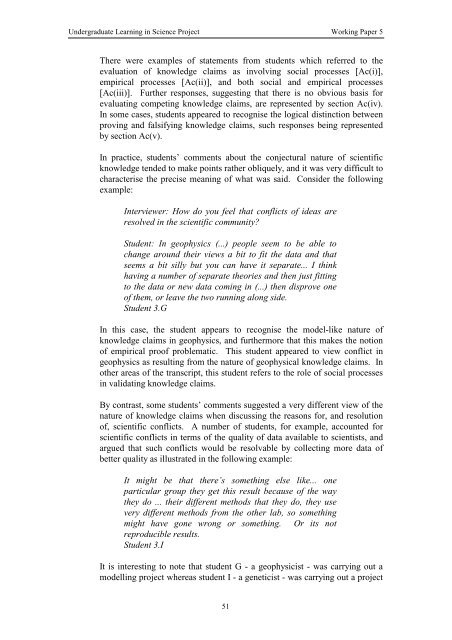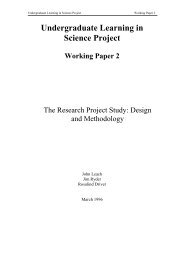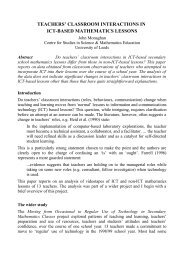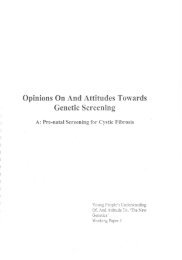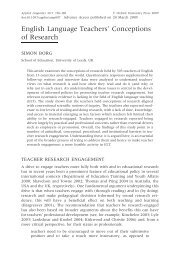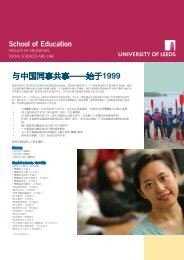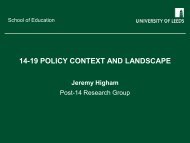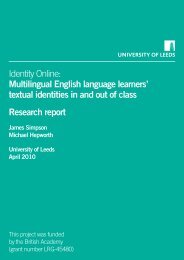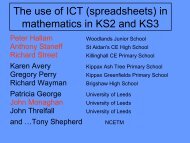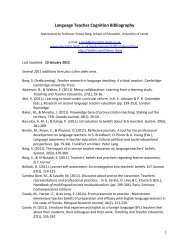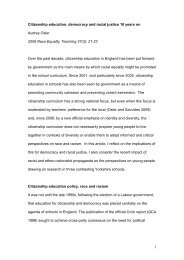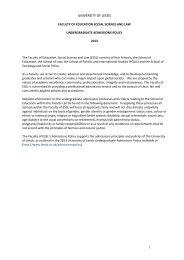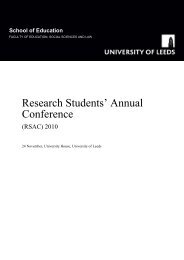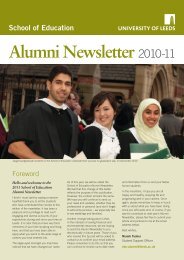Undergraduate science research projects and students - School of ...
Undergraduate science research projects and students - School of ...
Undergraduate science research projects and students - School of ...
You also want an ePaper? Increase the reach of your titles
YUMPU automatically turns print PDFs into web optimized ePapers that Google loves.
<strong>Undergraduate</strong> Learning in Science Project Working Paper 5There were examples <strong>of</strong> statements from <strong>students</strong> which referred to theevaluation <strong>of</strong> knowledge claims as involving social processes [Ac(i)],empirical processes [Ac(ii)], <strong>and</strong> both social <strong>and</strong> empirical processes[Ac(iii)]. Further responses, suggesting that there is no obvious basis forevaluating competing knowledge claims, are represented by section Ac(iv).In some cases, <strong>students</strong> appeared to recognise the logical distinction betweenproving <strong>and</strong> falsifying knowledge claims, such responses being representedby section Ac(v).In practice, <strong>students</strong>’ comments about the conjectural nature <strong>of</strong> scientificknowledge tended to make points rather obliquely, <strong>and</strong> it was very difficult tocharacterise the precise meaning <strong>of</strong> what was said. Consider the followingexample:Interviewer: How do you feel that conflicts <strong>of</strong> ideas areresolved in the scientific community?Student: In geophysics (...) people seem to be able tochange around their views a bit to fit the data <strong>and</strong> thatseems a bit silly but you can have it separate... I thinkhaving a number <strong>of</strong> separate theories <strong>and</strong> then just fittingto the data or new data coming in (...) then disprove one<strong>of</strong> them, or leave the two running along side.Student 3.GIn this case, the student appears to recognise the model-like nature <strong>of</strong>knowledge claims in geophysics, <strong>and</strong> furthermore that this makes the notion<strong>of</strong> empirical pro<strong>of</strong> problematic. This student appeared to view conflict ingeophysics as resulting from the nature <strong>of</strong> geophysical knowledge claims. Inother areas <strong>of</strong> the transcript, this student refers to the role <strong>of</strong> social processesin validating knowledge claims.By contrast, some <strong>students</strong>’ comments suggested a very different view <strong>of</strong> thenature <strong>of</strong> knowledge claims when discussing the reasons for, <strong>and</strong> resolution<strong>of</strong>, scientific conflicts. A number <strong>of</strong> <strong>students</strong>, for example, accounted forscientific conflicts in terms <strong>of</strong> the quality <strong>of</strong> data available to scientists, <strong>and</strong>argued that such conflicts would be resolvable by collecting more data <strong>of</strong>better quality as illustrated in the following example:It might be that there’s something else like... oneparticular group they get this result because <strong>of</strong> the waythey do ... their different methods that they do, they usevery different methods from the other lab, so somethingmight have gone wrong or something. Or its notreproducible results.Student 3.IIt is interesting to note that student G - a geophysicist - was carrying out amodelling project whereas student I - a geneticist - was carrying out a project51


